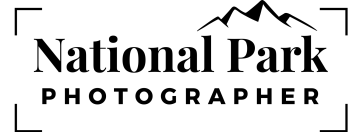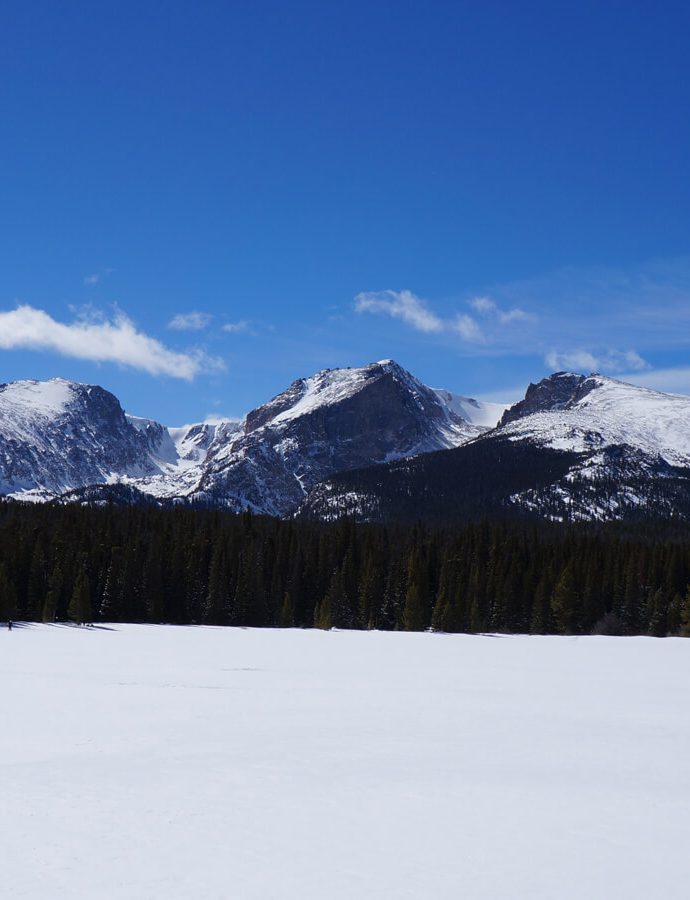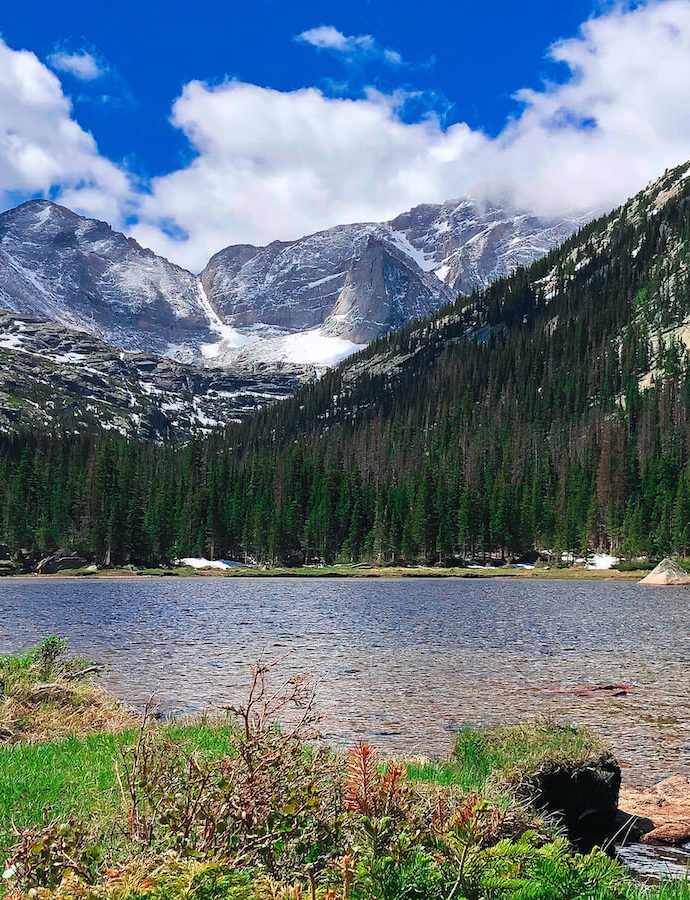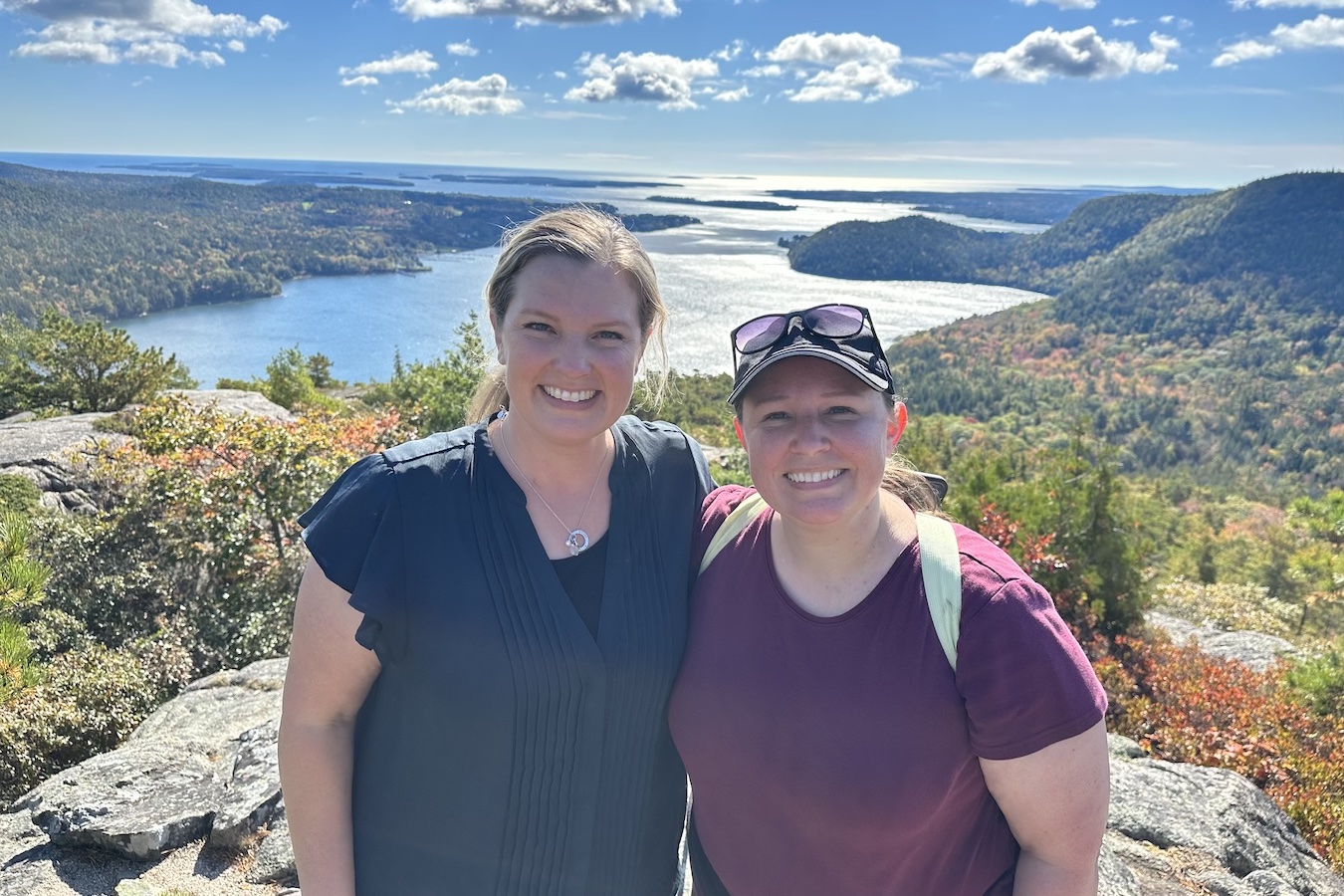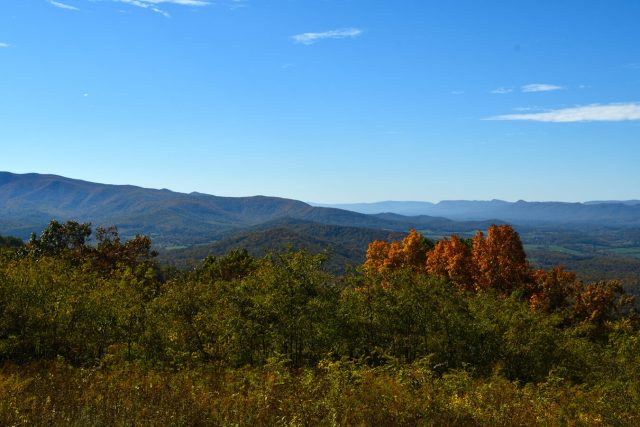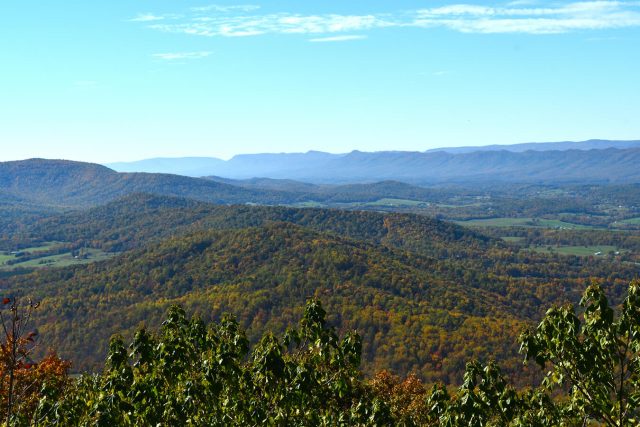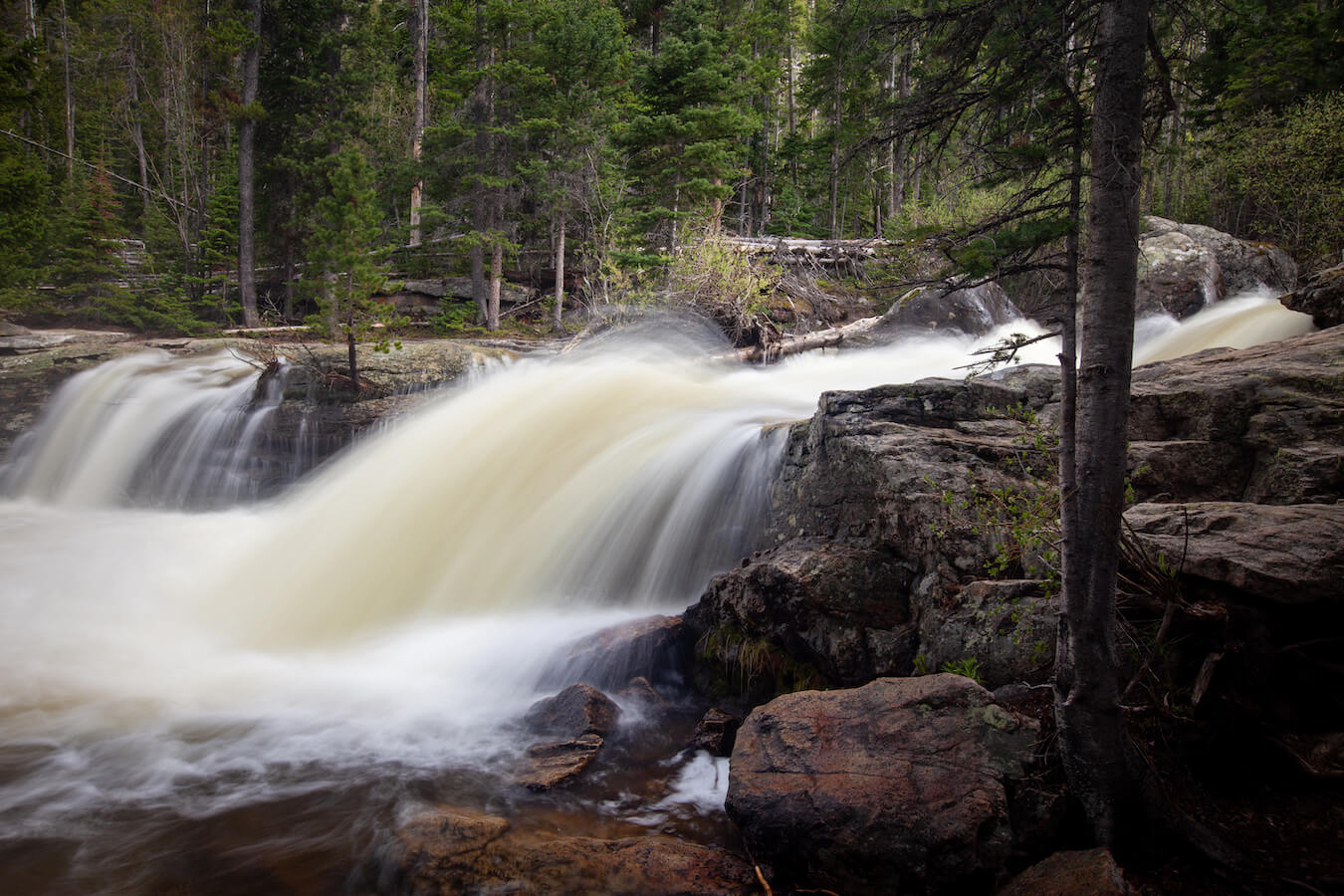
Length: 0.6 – 0.9 mi (1.0 – 1.4 km)
Elevation Gain: 15 ft – 75 ft (4.6 – 22.9 m)
Route Type: Out and Back
Difficulty: Easy
Copeland Falls is a beautiful two-tiered waterfall found in the Wild Basin area of Rocky Mountain National Park. This is the most accessible waterfall in the area and is well worth the short hike to get there. The hike to Copeland Falls offers a peaceful escape along with countless photography opportunities.
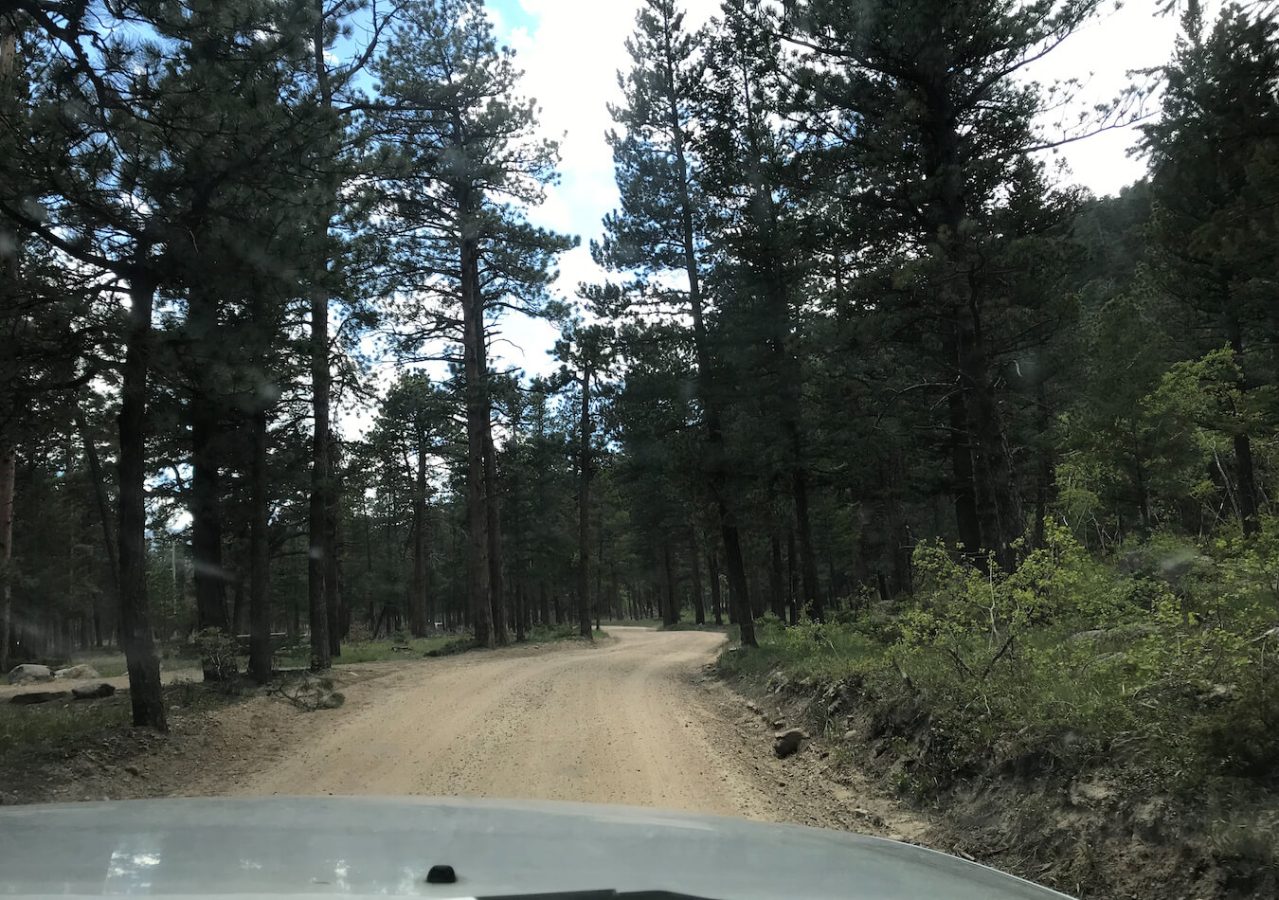
Accessing Copeland Falls
Starting Location: Wild Basin Parking Lot, Allenspark, CO, 80510
GPS (DD): 40.208096, -105.566452
The Wild Basin area in Rocky Mountain National Park is a more remote section located in the southeastern end of the park. You can access this area from CO-7 W. From here you will turn onto County Rd 84 W and will then turn right onto Co Hwy 115. The Wild Basin Trailhead parking lot is located at the end of this short, 2.2 mi (3.5 km) gravel road. Even though it isn’t paved, it is perfectly accessible to normal 2-wheel drive cars. You will find the Wild Basin Trailhead on the south side of the parking lot.
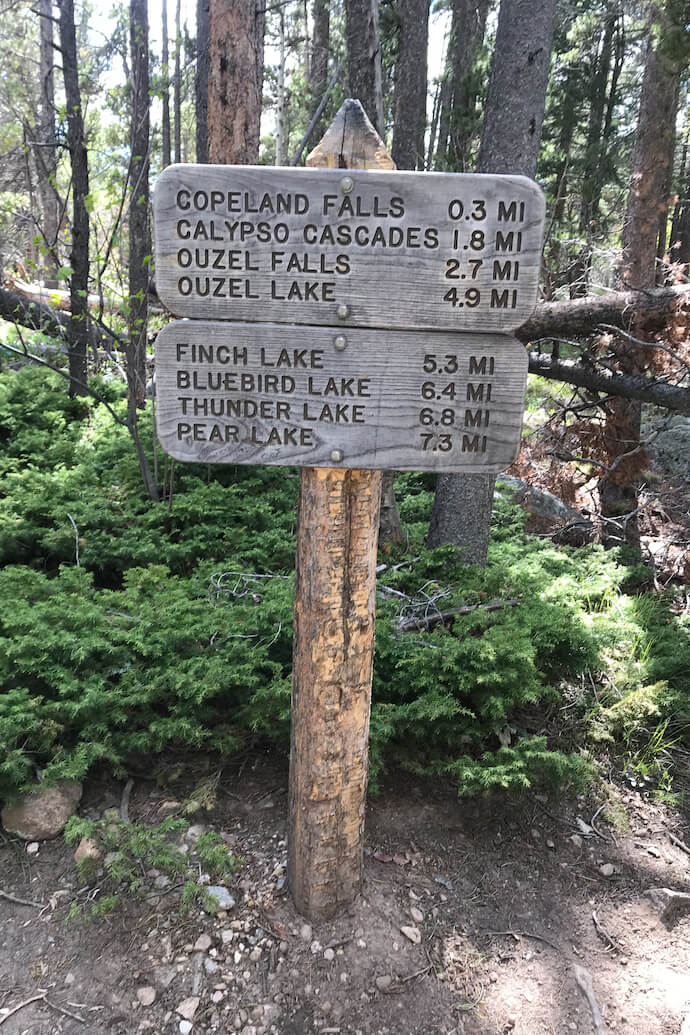
From the Wild Basin Trailhead, you can access different hiking trails leading to Copeland Falls, Calypso Cascades, Ouzel Falls, Ouzel Lake, Finch Lake, Bluebird Lake, Thunder Lake, and Pear Lake. You will want to follow the signs leading to Copeland Falls.
Please note that at the time of this writing, timed entry tickets are required to enter Rocky Mountain National Park during the peak season. You can visit the NPS website for the current timed entry requirements.
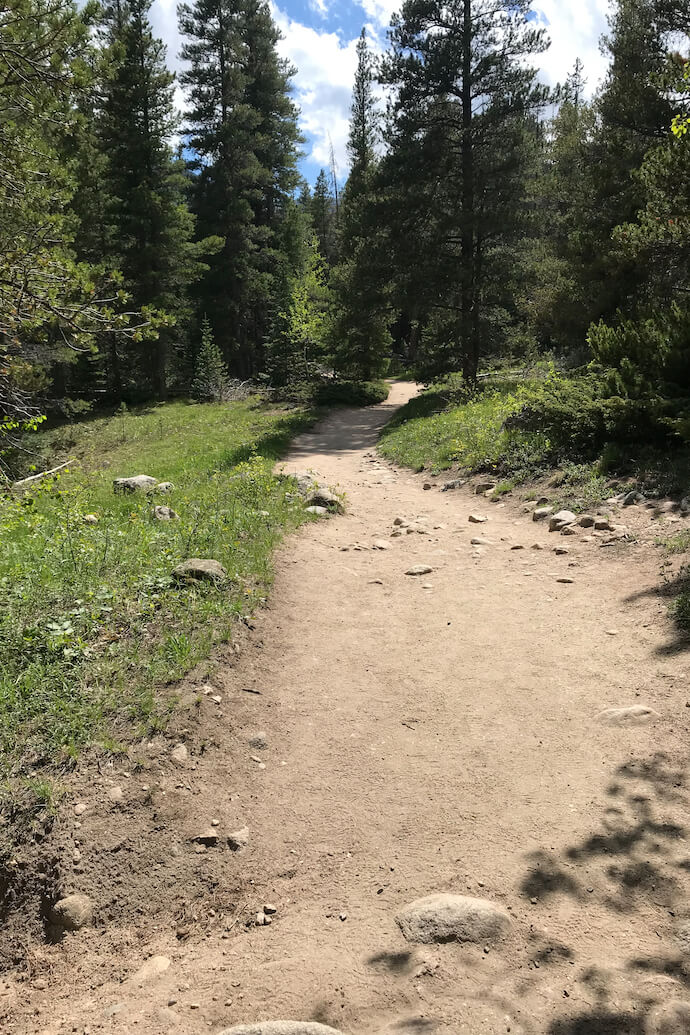
Hiking Tips for Copeland Falls
The main hiking trail to Copeland Falls, while uneven in places, is simply beautiful. There is a lot of shade and you will hear the gentle echo of the North St. Vrain Creek during your entire hike. The beginning section of the trail to the base of Copeland Falls is easy to follow with a very minimal elevation gain. Along the trail you will have several chances to see beautiful vistas of the North St. Vrain Creek as well as different photographic compositions of the quaking Aspens and surrounding natural beauty.
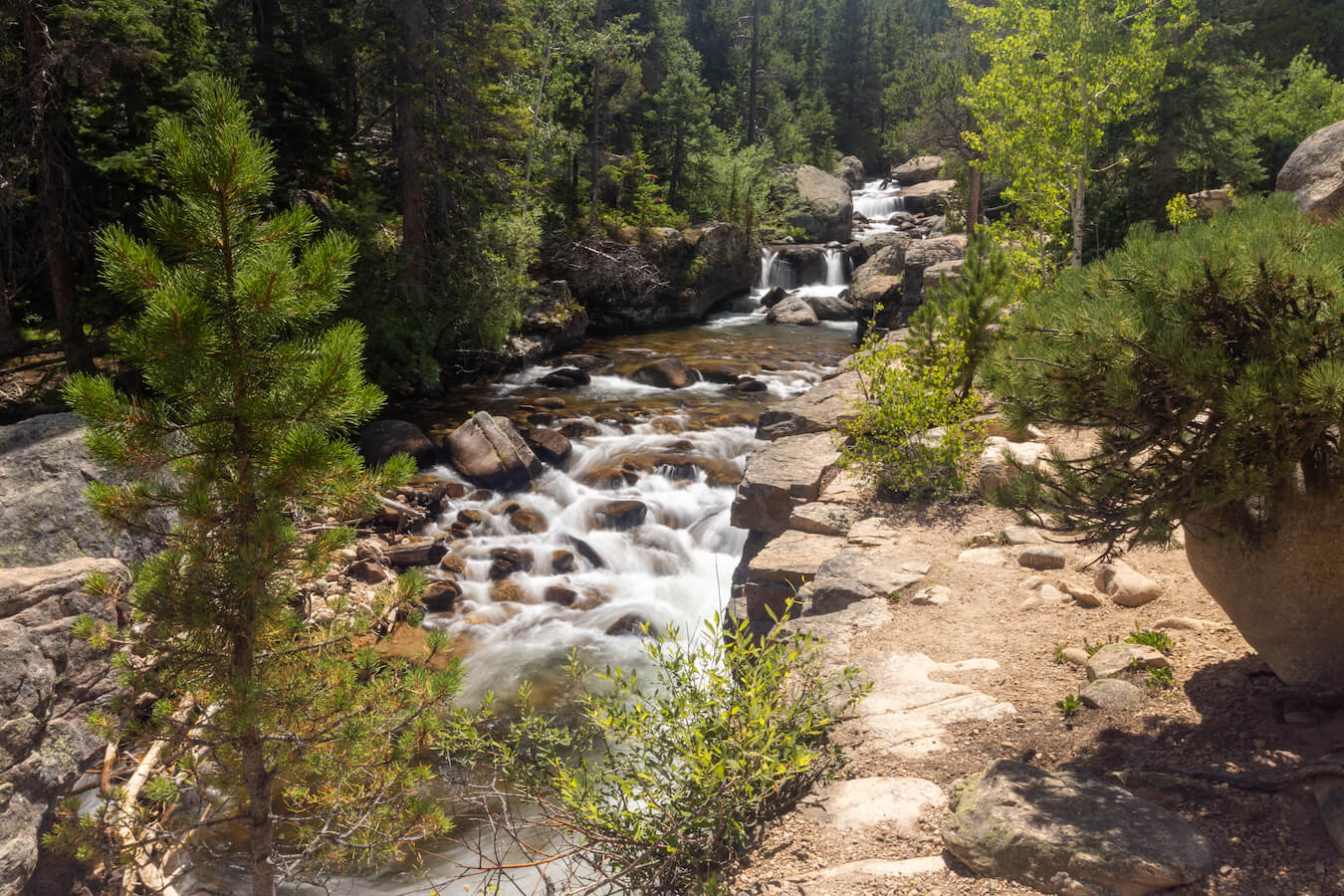
North St. Vrain Creek
The North St. Vrain Creek is a highlight of the Copeland Falls Hike as it will be your constant companion. There will be several access points to the North St. Vrain Creek on the way to and surrounding Copeland Falls. All of them provide spectacular long-exposure, slow water photography opportunities. I could have spent all day there if I had had the time.
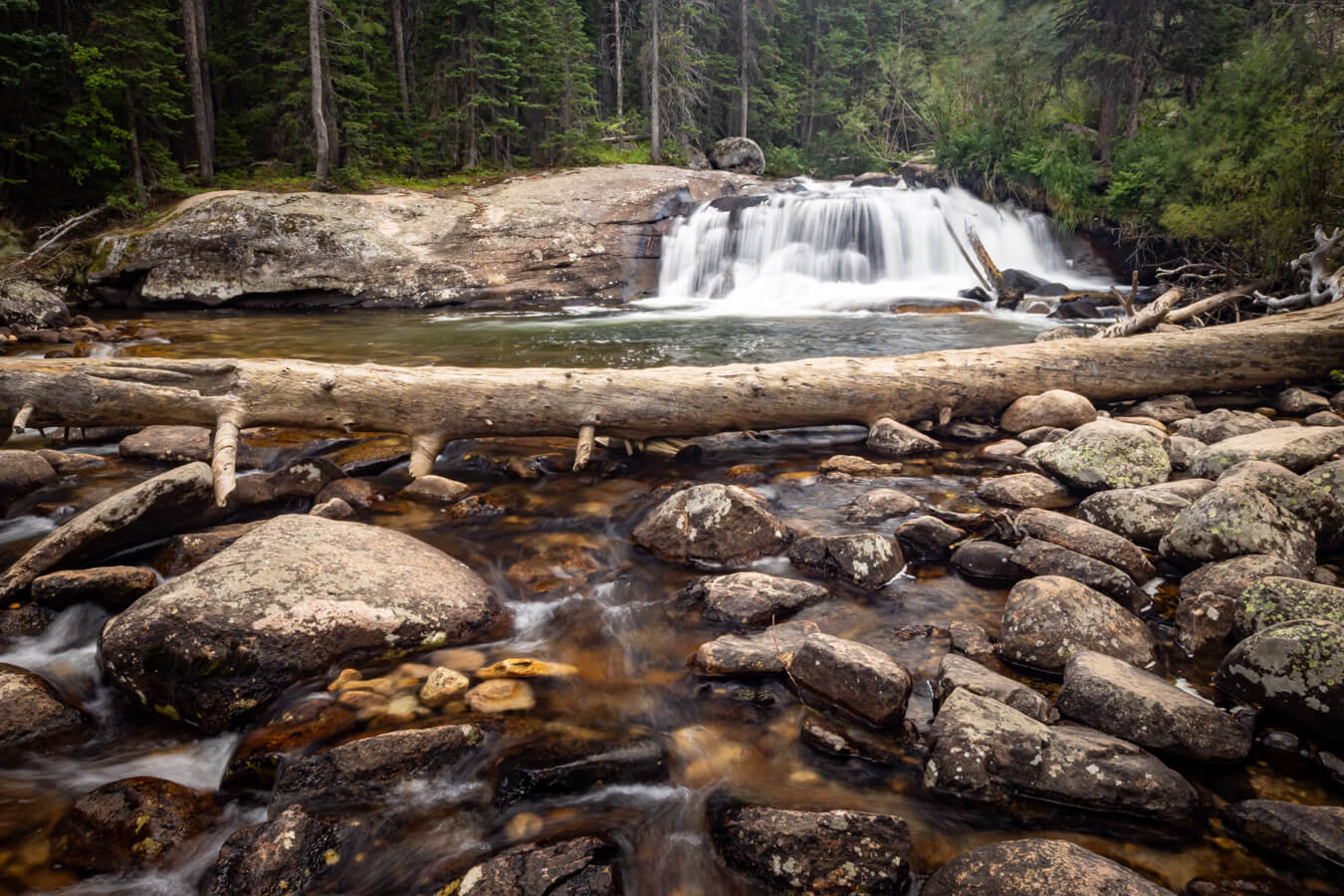
Lower Copeland Falls
After hiking for about 0.3 mi (1.0 km), you will be able to access both Lower and Upper Copeland Falls from the main trail. When I went the second time, I started by exploring Lower Copeland Falls first. As the water level was low, I was able to walk out a little bit into the creek and set up my camera tri-pod on three rocks for stability. Lower Copeland Falls is a really beautiful location and well worth exploring.
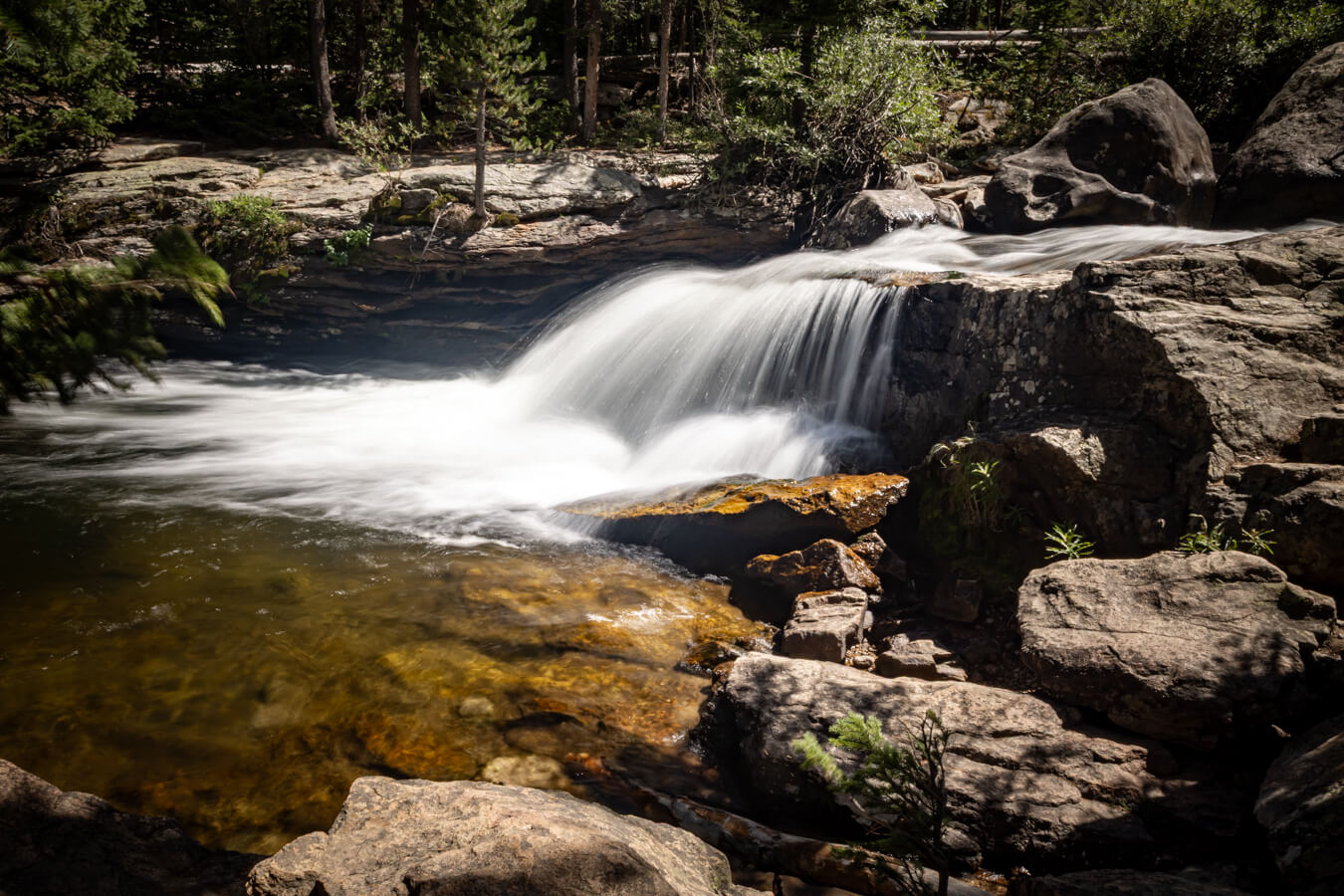
Upper Copeland Falls
When you are done visiting Lower Copeland Falls, head back up towards the trail until you see the sign for Upper Copeland Falls. From this small side trail, you can hike up towards the upper section of Copeland Falls. The water flow at Upper Copeland Falls will vary depending upon the time of year. When I went in June, the river was so full that the upper falls split into several sections (see the image at the top of this page). In August, only a single waterfall was visible (see image below), though it was still beautiful.
From the Upper Copeland Falls vantage point, if you continue up the side trail it will eventually lead you back up to the main trail. From that point, you can turn right to head back to the parking lot, or left to continue on to Calypso Cascades and Ouzel Falls.
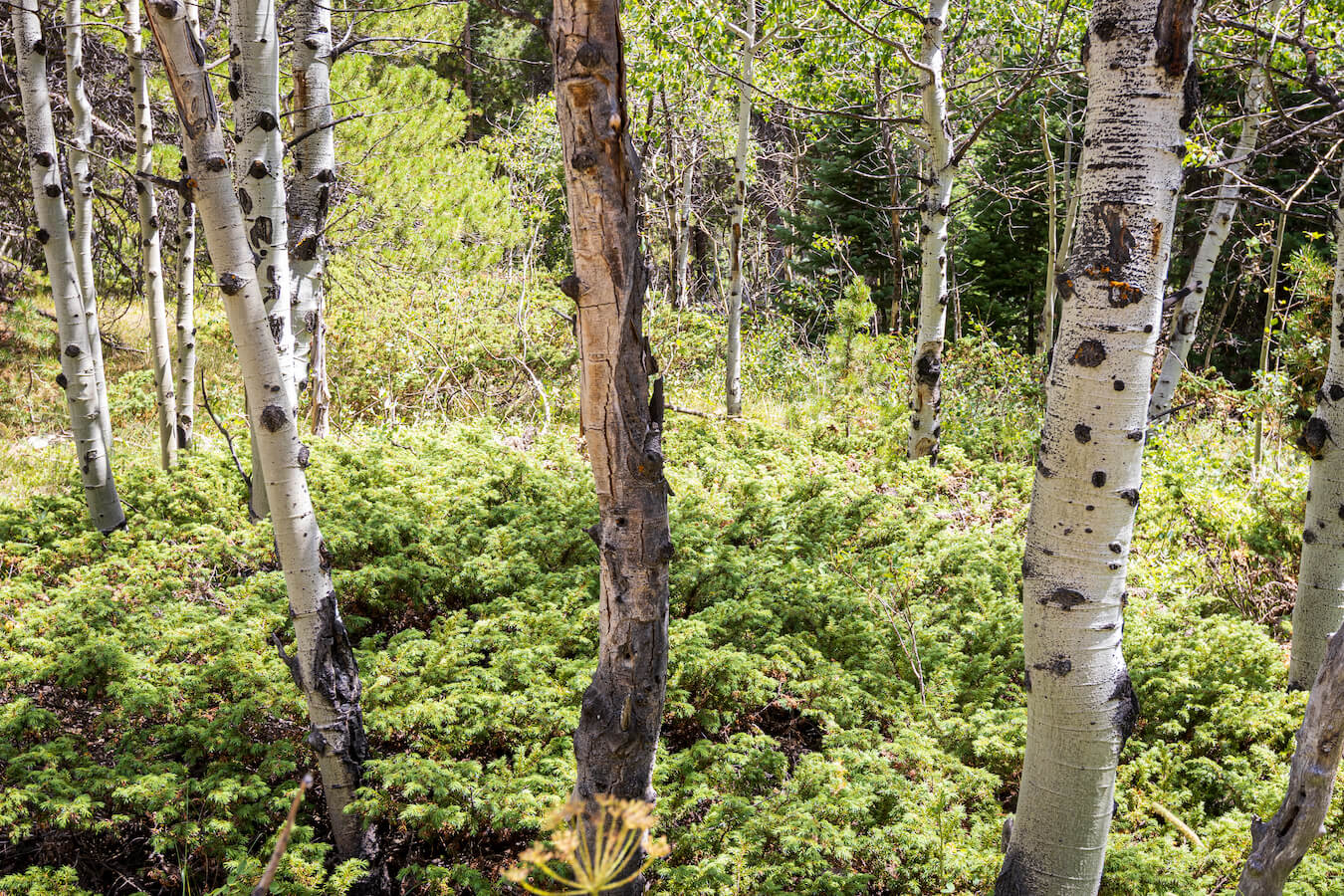
Recommended Emergency Supplies in Copeland Falls
Whenever you are traveling, it is always a good idea to bring extra emergency supplies. Here is a small list of recommended items to bring when you visit Copeland Falls:
If you will be hiking to more remote locations during your stay or hiking before sunrise or after sunset, these additional supplies are highly recommended:
- Flashlight/Headlamp (with batteries)
- Emergency Shelter (space blanket or poncho)
- Whistle/Signaling Device
- Extra Clothing
- Multi-Tool or Knife
- Additional Emergency Supplies (Click here for a complete list of our recommended photography and hiking gear)
Be Prepared for Limited Cell Service
National parks often have limited or spotty cell service so it is always helpful to have some sort of map or GPS-tracking device handy to assist with trail and road navigation. Even when you don’t think you will get lost, if the trails or roads are poorly marked, it is a possibility. Some GPS trackers, like the Garmin inReach and the Garmin inReach Mini, can also communicate your location to others. At a minimum, have a printed copy of the maps and hiking trails or download them to your phone.
Elevation Sickness
Visiting Rocky Mountain National Park, with elevations ranging from 7,500 to over 12,000 feet, can pose risks of elevation sickness (acute mountain sickness, AMS) due to lower oxygen levels at high altitudes. Warning signs include headache, nausea, dizziness, fatigue, shortness of breath, and difficulty sleeping, typically appearing within 6–12 hours of ascent. If untreated, Severe cases may lead to dangerous conditions like high-altitude pulmonary edema or cerebral edema, marked by confusion, severe breathing issues, or loss of coordination, requiring immediate descent and medical attention.
To stay safe, acclimate gradually by spending a day or two at lower elevations (e.g., Estes Park, ~7,500 feet) before hiking to Copeland Falls (~8,500 feet). Stay hydrated, avoid alcohol, eat high-carbohydrate meals, and ascend slowly to reduce risk. Monitor symptoms, descend if they worsen, and check NPS for altitude safety tips and emergency contacts.
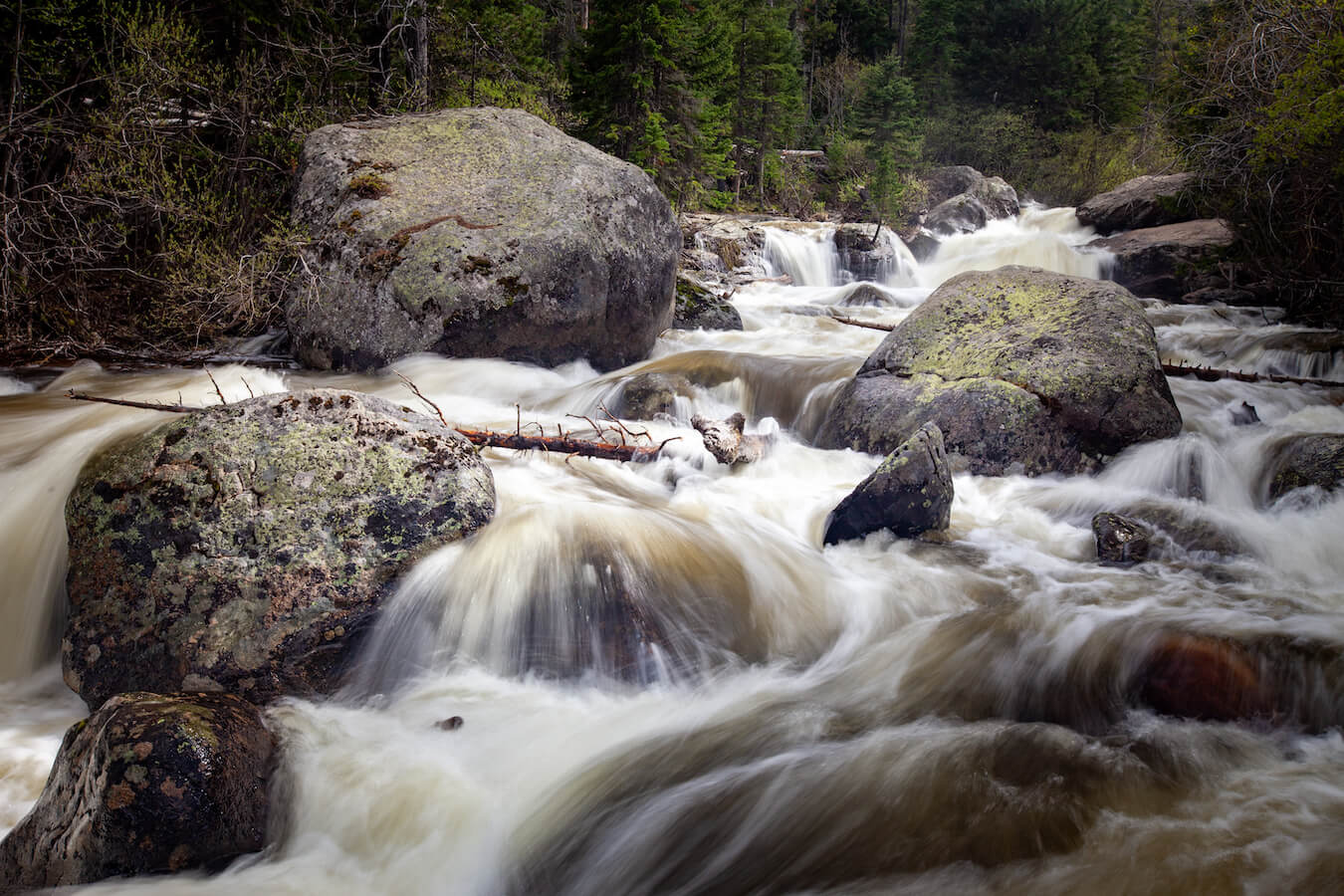
Best Time of Year to Visit Copeland Falls
I’ve been to Copeland Falls twice now. Once in June and then again in August. Both times were beautiful. Although June still had snow in the mountains, leaving some areas of Rocky Mountain National Park inaccessible, the hiking trail to Copeland Falls was clear from ice and the water was full.
My personal favorite time of year to photograph waterfalls is in the spring when the water is full from the spring rain or snow melt. As Rocky Mountain National Park is at a higher elevation, spring starts a little bit later here than at lower elevations. I found June to have pleasant temperatures as well as an incredible display of rushing water. We also saw more wildlife in June.
Late summer was also a beautiful time to visit Copeland Falls and Rocky Mountain National Park. I found the temperature to be pleasant and all of the trails were open to us. We were even able to camp at Moraine Campground for five days, which made traveling around the park super easy and accessible. Even though there were crowds, we went out early and stayed late at our top locations, which made it manageable for us.
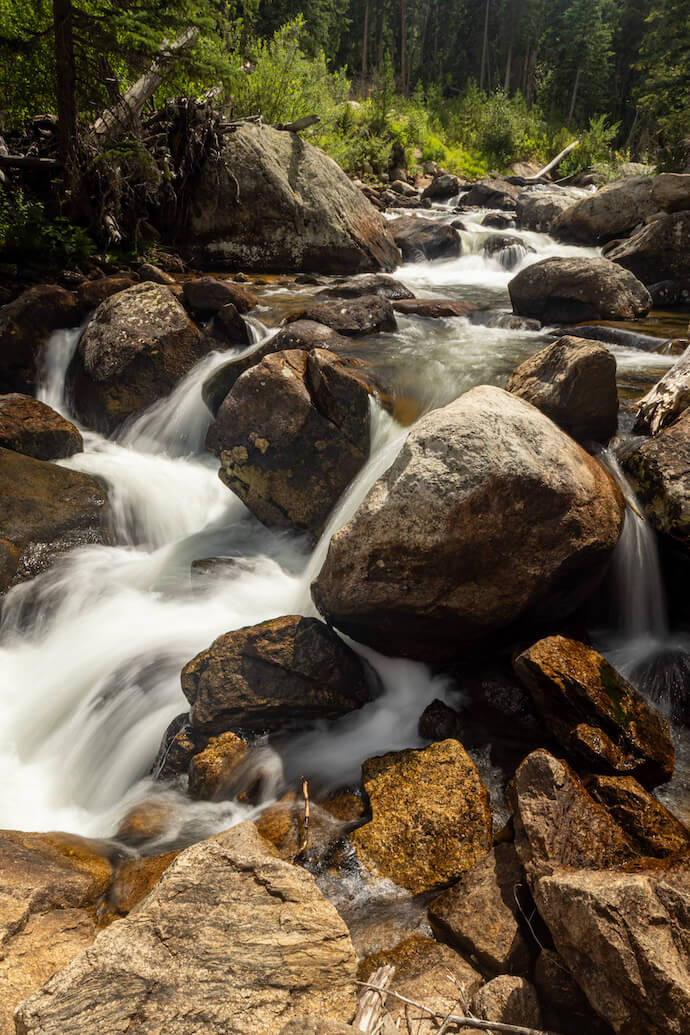
As the Wild Basin area of Rocky Mountain National Park is open year round, I imagine the changing colors of the leaves and the crisp Autumn air would be spectacular in the late Fall. If you can go before the snow closes down the main road, it would be well worth the trip and one I’d like to do someday.
Winter brings its own kind of magical beauty in Rocky Mountain National Park. One example in the Wild Basin area is Hidden Falls. Although this waterfall only has a tiny flow of water during the summer months, during the winter you will be able to hike along the Hidden Falls horse trail to see an impressive ice column formed from Hidden Falls. (Rocky Mountain Day Hikes)
Though less traveled at this time, many locals have found solitude and serenity during the winter months. According to Rocky Mountain Day Hikes, there is a winter parking area for the Wild Basin Area. From there, you can use crampons or snowshoes to walk along the one mile, snow packed road to reach the parking area and trailheads. I love using my Kahtoola ExoSpikes when hiking on icy trails! From the parking area, you can access the Wild Basin Trailhead and attempt to hike to Copeland Falls and beyond with the proper gear.
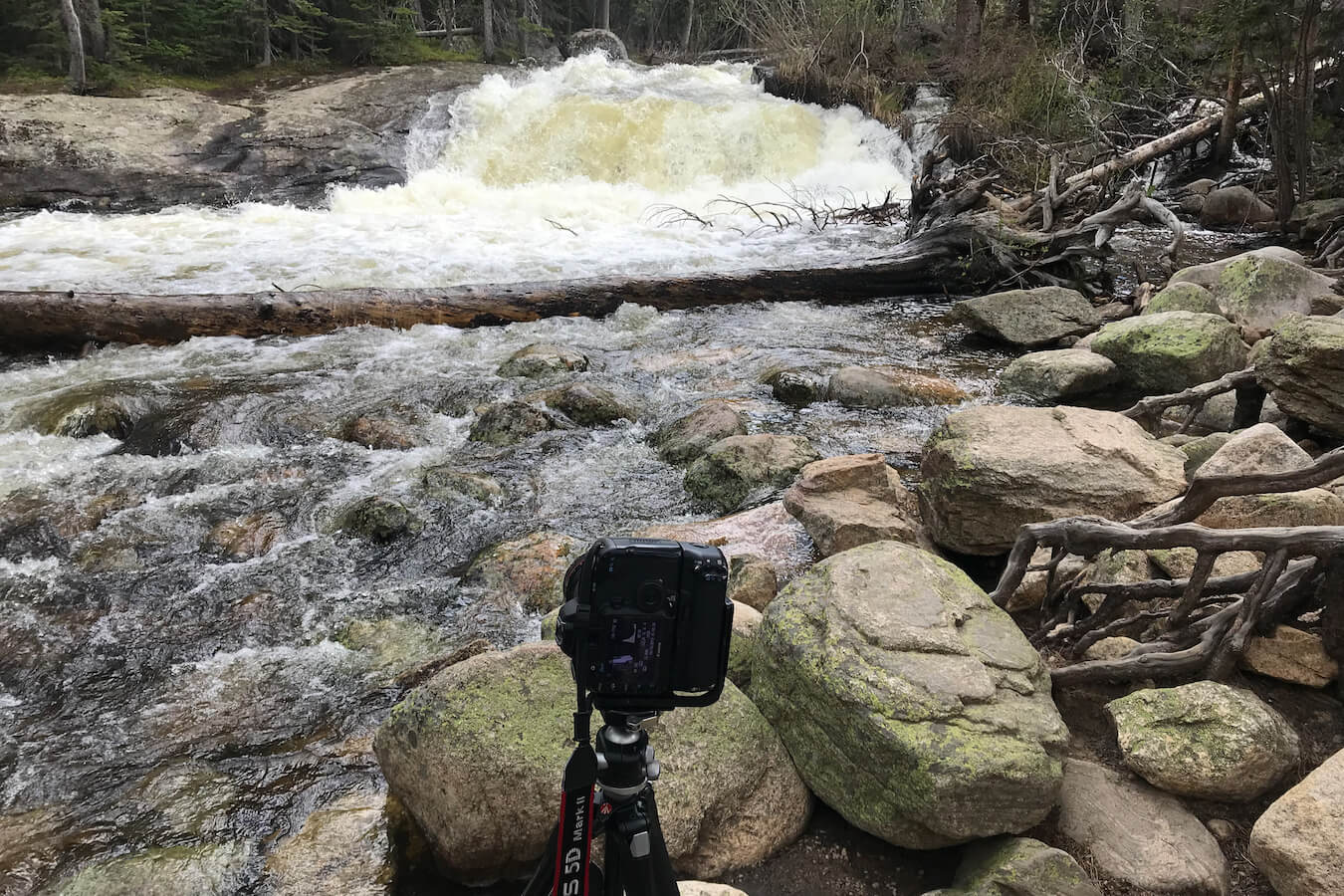
Photography Tips for Copeland Falls
One of my favorite ways to photograph waterfalls is to use a variable neutral density filter and polarizer. Waterfalls are best photographed when there is complete cloud cover, or in the early morning or late evening hours. Consistent lighting is key when doing a long exposure shot of water, otherwise, you will get hot spots in your photo.
When we went to Copeland Falls the second time, we actually arrived during the middle of the day, which was not the ideal time for photography. This is where patience paid off. I set up my tripod in the location I wanted and then I waited. Thankfully, there were some clouds in the sky that eventually covered the sun. While I only had a few seconds at a time, I was able to capture the image I was hoping for thanks to the cloud cover.
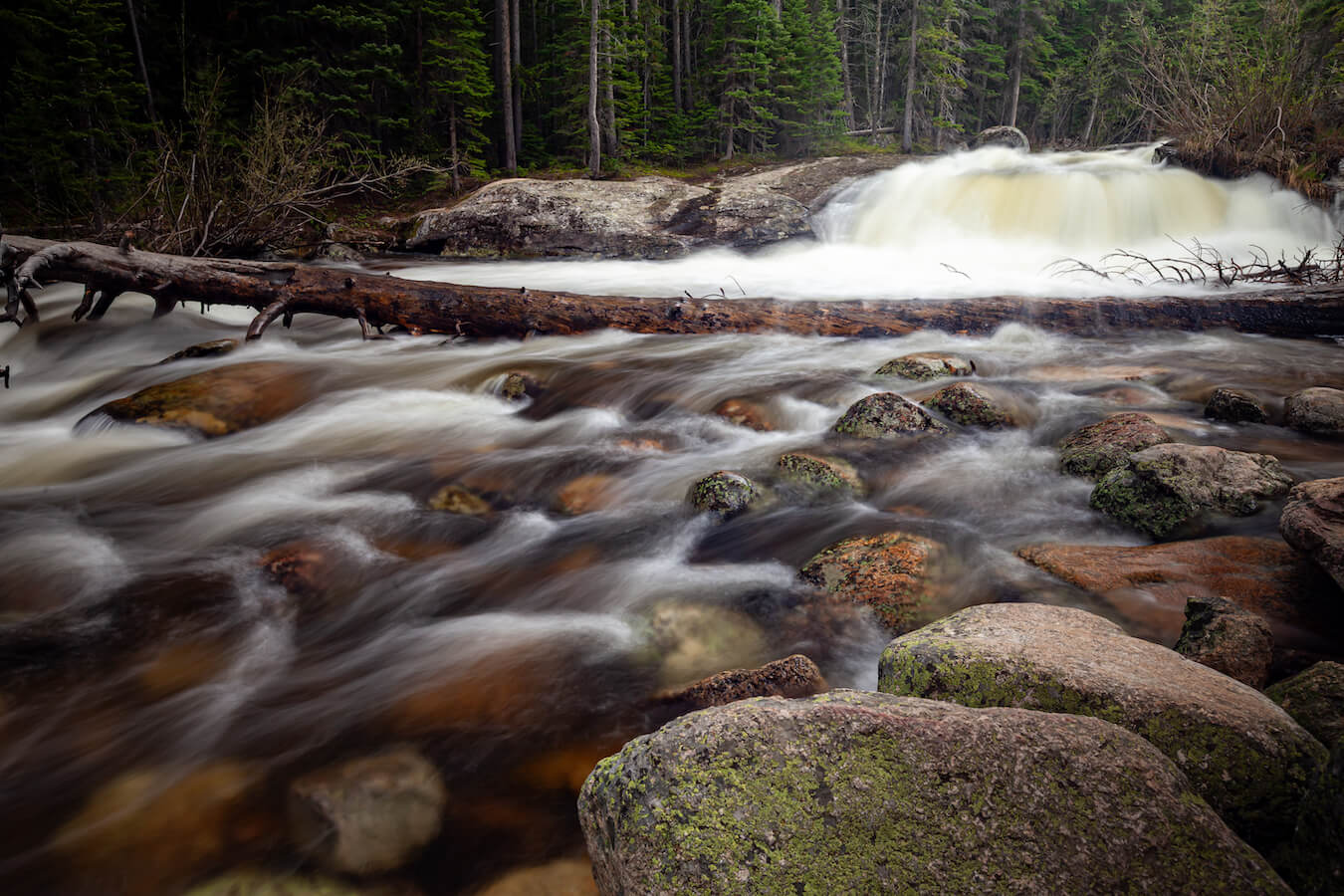
A good tri-pod is also a must for slow-exposure photography. I currently use a Really Right Stuff carbon fiber tripod with a ball head, and a Singh-Ray Vari-N-Duo™ Variable Neutral Density (ND) Filter for my soft water shots. I really want to try out the Singh-Ray Bryan Hansel Waterfall Polarizer filter one day but haven’t been able to justify the cost yet. Rock claws for your tri-pod are also essential if you want a good grip while photographing slow water shots in a creek on slippery rocks. Having a mirrorless Camera, like the Canon R5, is also helpful when photographing long-exposure shots.
Closing Remarks
I loved my time spent at Copeland Falls in Rocky Mountain National Park! The weather was perfect and the ambience was exactly what I needed to recharge. I am grateful that I had the opportunity to visit and explore this beautiful National Park.
Find Your Favorite Location
No matter where you go in Rocky Mountain National Park, be sure to take your time and find your favorite location along the way. If you are lucky, you may even spot some wildlife! Don’t forget to add detailed macro shots, change your perspective, and most importantly have fun.
Before making your trip, consider checking the official Rocky Mountain National Park website or contacting the park’s visitor center for the most up-to-date information on trail conditions, accessibility, and any recent changes. As with any visit to a national park, it’s important to follow park regulations, practice “Leave No Trace” principles, and prioritize safety while exploring this beautiful area. I hope you enjoy your time photographing Copeland Falls!
Happy Travels!
Juventa, Co-Owner, National Park Photographer
Want to learn more about Rocky Mountain National Park? Check out these maps, guides & books:
- Rocky Mountain National Park (National Geographic Trails Illustrated Map)
- Rocky Mountain National Park: The Complete Guide: (Color Travel Guide)
- Rocky Mountain National Park: The First 100 Years
- Mystery In Rocky Mountain National Park (National Park Mystery Series)
- Best Easy Day Hikes Rocky Mountain National Park (Best Easy Day Hikes Series)
- Death in Rocky Mountain National Park (Death in the Parks)
- It Happened In Rocky Mountain National Park: Stories of Events and People that Shaped a National Park (It Happened In Series)
Please note, by making purchases through our affiliate links, you are supporting our mission to celebrate and showcase our National Parks and the photographers who frequent them. As an Amazon Associate, National Park Photographer earns from qualifying purchases at not cost to you. We appreciate your support.
